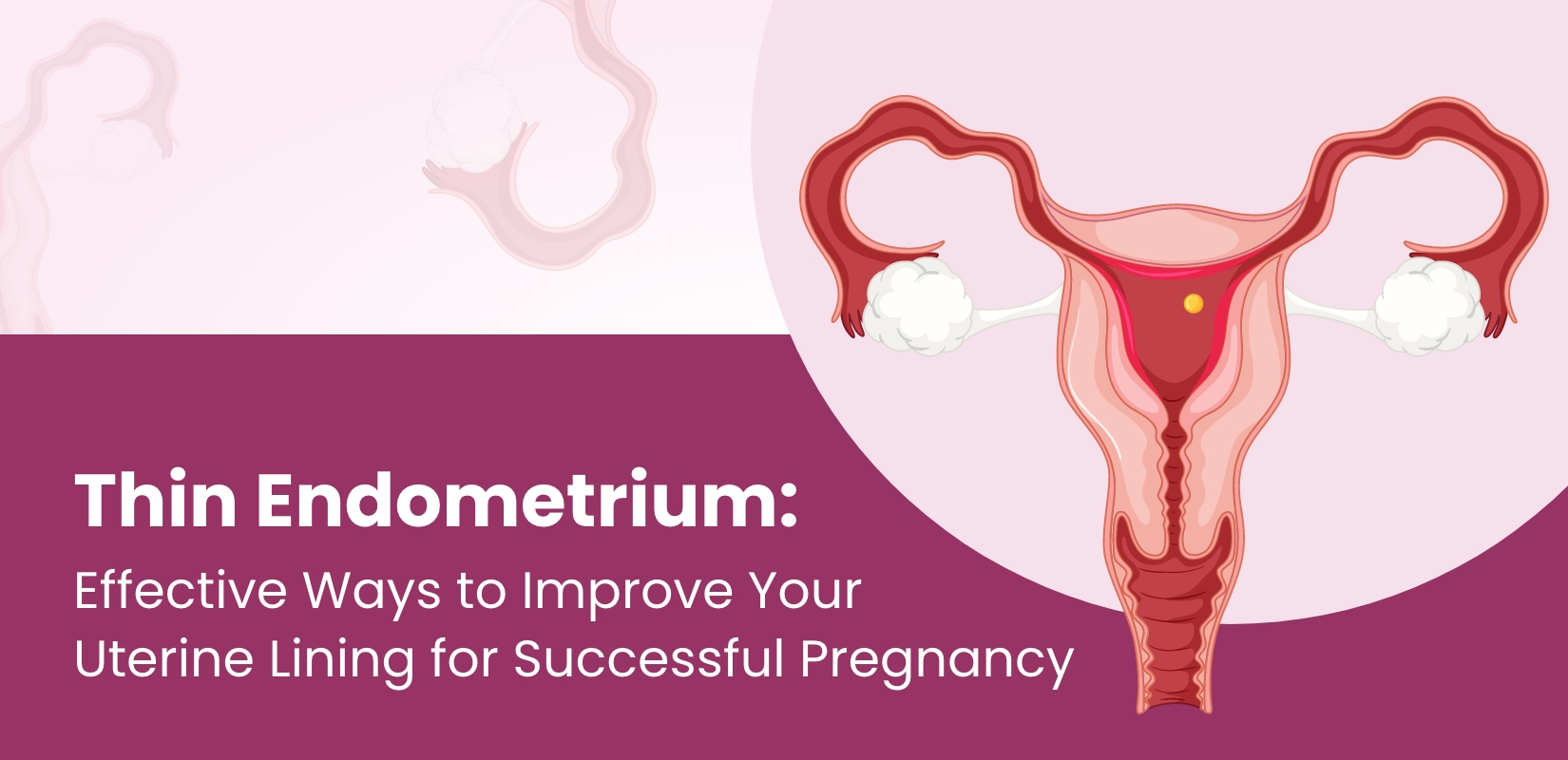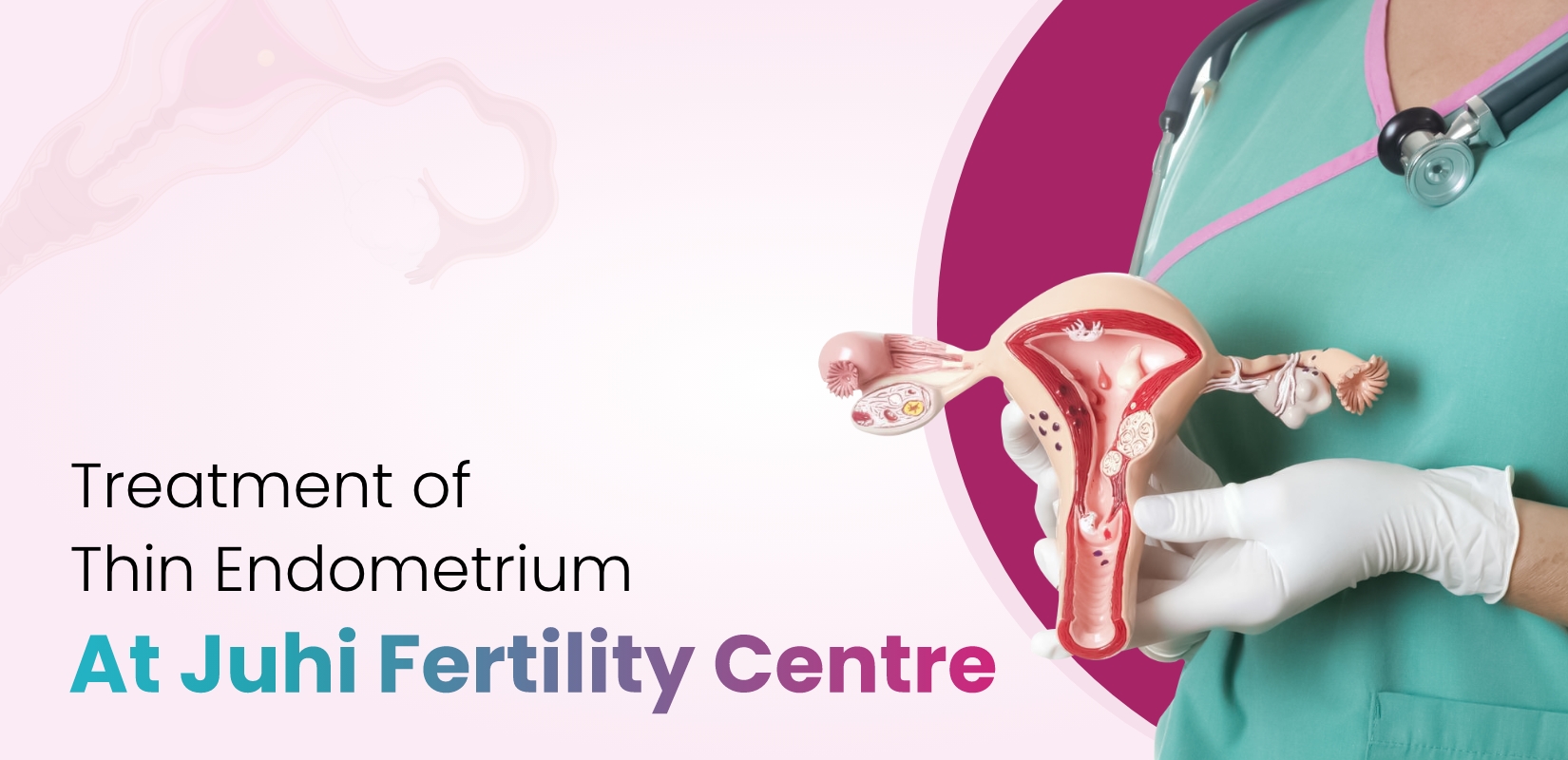Infertility is a global health issue affecting millions of couples worldwide, and India is no exception. In fact, according to recent statistics, around 27.5 million couples in India are estimated to be affected by infertility, making it a prevalent concern in the country. Among the various causes of infertility, a thin endometrium is one of the most common issues that women face, leading to difficulties in conceiving and carrying a pregnancy to term.
A thin endometrium is a condition where the endometrial lining of the uterus fails to thicken adequately, measuring less than 7mm in thickness. This lining is essential for the implantation of a fertilized egg during the menstrual cycle. However, it may not grow to the optimal thickness, which can affect the chances of successful conception. Despite being discouraging for couples trying to conceive, there are various effective ways to improve the uterine lining and increase the chances of a successful pregnancy.
In this blog post, we will explore the causes and symptoms of thin endometrium, along with proven ways to improve the uterine lining for successful conception and pregnancy. From making lifestyle changes to seeking medical treatments, we'll provide you with valuable insights and relevant ways to help you on your journey toward parenthood. So, whether you're currently struggling with infertility or looking to optimize your reproductive health, read on to learn all about thin endometrium and how to improve it.
Causes of thin endometrium:
There are several factors that can contribute to a thin endometrium. Some of the most common causes include:
- Hormonal imbalances:Hormones like estrogen and progesterone play a crucial role in the development and thickening of the uterine lining. Any imbalance in these hormones can lead to a thin endometrium.
- Poor blood flow: A healthy blood flow to the uterus is essential for the development of a thick and healthy endometrium. Any condition that restricts blood flow to the uterus can result in a thin endometrium.
- Age:As women get older, their body's ability to produce estrogen decreases. This can lead to a thinning of the endometrial lining.
- Infection or inflammation:Infections or inflammation of the uterus can lead to scarring or damage to the endometrial lining, which can make it difficult for a fertilized egg to implant.
Symptoms of thin endometrium
The most common symptom of a thin endometrium is difficulty in getting pregnant. Here are some of the most common symptoms of a thin endometrium:
- Irregular or Absent Periods:Women with a thin endometrium may experience irregular periods or no periods at all. This is because the endometrium may not grow thick enough to trigger a menstrual cycle.
- Infertility:Thin endometrium is a leading cause of infertility in women. A thin endometrium can make it difficult for a fertilized egg to implant and grow properly, leading to failed pregnancies or difficulty conceiving.
- Heavy or Prolonged Bleeding:In some cases, women with a thin endometrium may experience heavy or prolonged bleeding during their menstrual cycle. This can be due to hormonal imbalances or other underlying medical conditions.
- Painful Periods:Women with a thin endometrium may also experience painful periods due to the uterus's inability to contract and shed the endometrial lining properly.
- Hormonal Imbalances:Thin endometrium can also cause hormonal imbalances, leading to symptoms such as hot flashes, mood swings, and sleep disturbances.
Effective Ways to Improve Your Uterine Lining for Successful Pregnancy
If you are struggling with a thin endometrium, there are several things you can do to improve your chances of a successful pregnancy. Some effective ways to improve your uterine lining include:
- Hormone therapy:Your doctor may prescribe hormones like estrogen and progesterone to help thicken your endometrial lining.
- Acupuncture:Acupuncture has been shown to improve blood flow to the uterus, which can help improve the thickness of the endometrial lining.
- Nutritional supplements:Certain supplements like L-arginine, vitamin E, and omega-3 fatty acids have been shown to improve the thickness of the endometrial lining.
- Lifestyle changes:Maintaining a healthy diet and exercising regularly can help improve your overall health and increase blood flow to the uterus.
Treatment of Thin Endometrium At Juhi Fertility Centre
If you're facing challenges due to a thin endometrium, there's hope! Juhi Fertility Centre is a top-tier fertility hospital located in Hyderabad, specializing in diagnosing and treating infertility issues, including thin endometrium. Our experienced team of specialists offers a variety of treatment options tailored to your unique needs, from hormone therapy to advanced treatments like in vitro fertilization (IVF). With our state-of-the-art technology and personalized approach to care, we're committed to helping you achieve your dream of parenthood.
- Accurate Diagnosis:A fertility hospital can conduct a series of diagnostic tests to determine the underlying cause of infertility, including a thin endometrium. These tests may include ultrasound scans, hormone tests, and hysteroscopy.
- Personalized Treatment Plans:Based on the diagnosis, a fertility hospital can create personalized treatment plans tailored to an individual's specific needs and circumstances. Treatment options for thin endometrium may include medications to stimulate the endometrial lining's growth or advanced reproductive technologies like in vitro fertilization (IVF).
- Monitoring and Support:A fertility hospital can provide ongoing monitoring and support throughout the treatment process, ensuring that patients receive the best possible care. They can also offer emotional support, counseling, and guidance, helping couples navigate the complexities and challenges of infertility.
- State-of-the-Art Technology:Fertility hospitals often use the latest technology and equipment to provide the most effective treatments possible. This includes advanced techniques like embryo monitoring, preimplantation genetic testing, and more.
- High Success Rates:Fertility hospitals have high success rates in helping couples achieve successful pregnancies, even in cases of infertility caused by a thin endometrium.
Conclusion
In conclusion, infertility is a common concern globally, and a thin endometrium is one of the leading causes of infertility in women. The uterine lining's thickness is crucial for a successful pregnancy, and any disruption can lead to difficulty conceiving or carrying a pregnancy to term. However, there are effective ways to improve the uterine lining and increase the chances of a successful pregnancy. From lifestyle changes to medical treatments, various options are available to improve the uterine lining's thickness and support a healthy pregnancy. It is essential to seek medical help from fertility hospitals like Juhi Fertility Centre for accurate diagnosis, personalized treatment plans, and ongoing support throughout the treatment process. With the right care and support, it is possible to overcome the challenges of thin endometrium and achieve the dream of parenthood.
Leave a Reply
Your email address will not be published. Required fields are marked *

